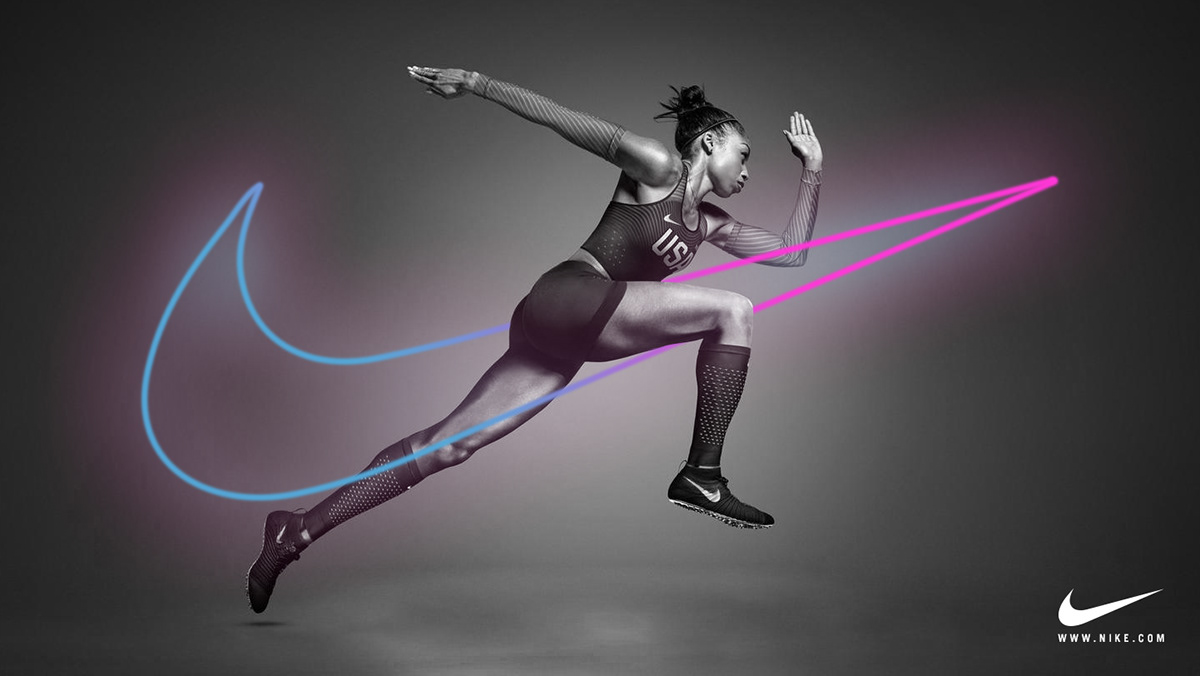Nike, one of the world’s leading sports brands, has had a significant impact on the global sports industry since its establishment in 1964. Over the years, Nike has become a household name, and its iconic swoosh logo is recognized around the world. Here are some of the ways Nike has influenced the global sports industry:
- Innovation
- Marketing
- Sponsorship
- Corporate Social Responsibility
Overall, Nike’s impact on the global sports industry cannot be understated. The brand has set new standards in innovation, marketing, sponsorship, and corporate social responsibility, and it continues to be a major player in the industry today.
1.Innovation
Nike has been a pioneer in innovation within the sports industry, introducing new materials and technologies to enhance athletic performance and improve athletes’ experience. Here are some examples of Nike’s innovative products:
- Nike Air: Nike’s Air technology was introduced in 1979 and revolutionized the sports industry. Air technology involves embedding air cushioning units into the sole of a shoe, providing extra support and shock absorption for athletes. This technology has been used in many Nike products, including running shoes, basketball shoes, and cross-training shoes.
- Flywire: Nike’s Flywire technology was introduced in 2008 and involved using ultra-thin, high-strength fibers to reinforce areas of a shoe where athletes need extra support. This technology reduces the weight of the shoe while still providing the necessary support for high-intensity activities.
- Dri-FIT: Nike’s Dri-FIT technology is a moisture-wicking fabric that pulls sweat away from the skin, keeping athletes cool and dry during intense workouts. This technology has been used in many of Nike’s clothing products, including shirts, shorts, and leggings.
- Nike Vaporfly: The Nike Vaporfly is a running shoe that was introduced in 2016 and has been credited with helping athletes break world records. The shoe features a carbon-fiber plate and a foam sole that provides extra energy return, making it easier for athletes to run faster and longer.
- Nike Adapt: Nike’s Adapt technology is a self-lacing shoe that uses a motor and gears to adjust the fit of the shoe automatically. The shoe is controlled through a smartphone app, allowing athletes to customize the fit and feel of the shoe based on their specific needs.
Overall, Nike’s innovation in the sports industry has helped to improve athletic performance, reduce injuries, and enhance the overall experience for athletes. Nike’s commitment to research and development ensures that it continues to be a leader in innovation within the sports industry.
2. Marketing
Nike is renowned for its successful marketing strategies, which have contributed to the brand’s global success and dominance in the sports industry. Here are some of Nike’s most notable marketing campaigns and strategies:
- “Just Do It”: Nike’s iconic “Just Do It” slogan was introduced in 1988 and has become one of the most recognizable slogans in advertising history. The campaign focused on inspiring athletes to push their limits and pursue their dreams, encouraging them to take action and “just do it.” The slogan has been used in countless Nike campaigns and has become synonymous with the brand.
- Celebrity Endorsements: Nike has signed endorsement deals with some of the world’s most successful and iconic athletes, including Michael Jordan, LeBron James, Cristiano Ronaldo, Serena Williams, and Tiger Woods, among others. These partnerships have not only helped to increase the brand’s visibility but have also connected the brand with the values and accomplishments of these athletes.
- Collaborations: Nike has collaborated with many popular brands and designers to create unique and limited-edition products. Some of Nike’s most notable collaborations include the Nike x Off-White collection, Nike x Supreme, and Nike x Comme des Garçons.
- Social Media: Nike has a strong presence on social media platforms such as Instagram, Twitter, and Facebook. The brand has utilized these platforms to connect with its target audience and share inspiring stories and content that aligns with its brand values.
- Sponsorships: Nike has sponsored many high-profile sporting events, teams, and athletes. The brand’s sponsorship deals with events such as the Olympics, FIFA World Cup, and NBA All-Star Game have helped to increase its visibility and reinforce its position as a leader in the sports industry.

Overall, Nike’s marketing strategies have been instrumental in establishing the brand as a household name and leader in the sports industry. The brand’s focus on inspiring and empowering athletes through its marketing campaigns has resonated with audiences worldwide and has helped to build a loyal following for the brand.
3. Sponsorship
Nike has a long history of sponsoring major sporting events, teams, and athletes, which has helped to increase the brand’s visibility and reinforce its position as a leader in the sports industry. Here are some examples of Nike’s sponsorship deals:
- Olympics: Nike has been a long-time sponsor of the Olympics, providing gear and apparel for athletes from around the world. The brand has sponsored athletes such as Michael Johnson, Carl Lewis, and Usain Bolt, among others, who have gone on to win gold medals in their respective events.
- FIFA World Cup: Nike has been a sponsor of the FIFA World Cup since 1994, providing gear and apparel for national teams participating in the tournament. The brand has also sponsored high-profile soccer players such as Cristiano Ronaldo, Neymar Jr., and Ronaldinho, among others.
- NBA: Nike has been the official supplier of NBA jerseys and apparel since 2017, and the brand has also signed endorsement deals with many NBA players, including LeBron James, Kevin Durant, and Kobe Bryant.
- NFL: Nike is the official supplier of NFL uniforms and apparel, and the brand has also signed endorsement deals with many NFL players, including Odell Beckham Jr., Saquon Barkley, and Russell Wilson.
- Tennis: Nike has sponsored many high-profile tennis players, including Rafael Nadal, Roger Federer, and Serena Williams. The brand has also sponsored major tennis tournaments, including the Australian Open and the US Open.

Overall, Nike’s sponsorship deals have helped to increase the brand’s visibility and build a strong association with some of the world’s most successful athletes and sporting events. These partnerships have also provided opportunities for Nike to showcase its innovative products and technology on a global stage.
4. Corporate Social Responsibility
Corporate social responsibility (CSR) is an important aspect of Nike’s business strategy. The company has been committed to making positive social and environmental impacts through its operations, products, and partnerships. Here are some examples of Nike’s CSR initiatives:
- Sustainable Innovation: Nike has made significant strides in developing sustainable products and technologies. The company has introduced materials such as recycled polyester, organic cotton, and Flyleather, a more sustainable alternative to traditional leather. Nike has also implemented sustainable manufacturing processes, including waterless dyeing and closed-loop recycling.
- Diversity and Inclusion: Nike is committed to promoting diversity and inclusion within its workplace and communities. The company has established partnerships with organizations such as Girls Inc., Black Girls CODE, and the Human Rights Campaign, among others, to advance diversity and inclusion initiatives. Nike has also implemented training programs to promote cultural competency and inclusion within its workforce.
- Community Investment: Nike has invested in various community initiatives, including programs that provide access to sports and physical activity for underserved youth. The company has also supported disaster relief efforts, including donating funds and products to help communities affected by natural disasters.
- Ethical Labor Practices: Nike has established rigorous standards for labor practices in its supply chain. The company has implemented the Code of Conduct for Nike’s contract factories, which outlines standards for worker rights, workplace conditions, and environmental sustainability. Nike also works closely with suppliers to ensure compliance with these standards.
- Climate Action: Nike is committed to addressing climate change through its operations and supply chain. The company has set ambitious targets to reduce carbon emissions and increase the use of renewable energy. Nike is also a founding member of the Climate Leadership Council, which aims to advocate for policies that address climate change.

Overall, Nike’s CSR initiatives demonstrate the company’s commitment to making a positive impact on society and the environment. By integrating sustainability, diversity, and ethical practices into its business strategy, Nike is working towards creating a more sustainable and inclusive future.
Conclusion:
Nike has had a significant impact on the global sports industry through its innovation, marketing, sponsorship, and corporate social responsibility initiatives. The company has revolutionized the sports industry through its innovative products and technologies, from the introduction of Air technology in the 1980s to the recent development of Flyknit and Flywire materials. Nike’s marketing campaigns have also been influential, showcasing the brand’s association with some of the world’s most successful athletes and sporting events.
Furthermore, Nike’s sponsorship deals have increased the brand’s visibility and provided opportunities to showcase its innovative products and technologies on a global stage. The company has also been committed to making positive social and environmental impacts through its corporate social responsibility initiatives, from sustainable innovation to diversity and inclusion, community investment, ethical labor practices, and climate action.

Overall, Nike’s impact on the global sports industry goes beyond its financial success. The brand has played a significant role in shaping the sports industry through its innovation, marketing, sponsorship, and commitment to social and environmental responsibility, making it a leader in the industry for decades.
















